- Home
- Peter F. Hamilton
Manhattan in Reverse Page 3
Manhattan in Reverse Read online
Page 3
‘Justin disagreed with you about atomic power? I thought he was an astrophysicist.’
‘He was. That’s why he disagreed. Damn silly star gazer. He kept insisting that fusion was the way forward, not fission. That one day we’d simply tap the sun’s power directly. What a beautiful dream. But that was Justin for you. Always went for the high concept.’
‘Can you tell me roughly what time you got the phone call from Mr Griffin telling you something was wrong?’ the detective asked.
‘That’s easy enough. It was just after half past eleven.’
‘I see. And where were you?’
Carter’s face reddened slightly. ‘I was with Chris in her studio. We went back there together after the meal.’
‘I see. Was that usual?’
‘Sometimes I’d go there, yeah. Nothing unusual about it.’
‘What exactly is your relationship with Miss Lockett? Her number was the first which your room-mate gave to Mr Griffith.’
‘We have a thing. It’s casual. Not serious at all. Is this relevant?’
‘Only in that it gives you and her a definite location at the time of the murder.’
‘Location . . .’ His eyes widened. ‘You mean an alibi.’
‘Yes. Providing Miss Lockett confirms it.’
‘Bloody hell, you’re serious, aren’t you?’
‘Absolutely. So tell me what you did after receiving the phone call from Mr Griffith.’
‘I went straight to Dunbar. Hailed a cab. It took about twenty minutes. They’d found the body by that time of course. I think you were there yourself by then.’
‘I probably was.’
‘You said you went straight to Dunbar College from Miss Lockett’s studio,’ I said. ‘When did you call Miss Caesar?’
‘As soon as I got to Dunbar. The police were everywhere, so I knew it was a real mess. I used Peter’s phone before I went into Justin’s room.’
‘Where was she?’
‘At her room in Uffers . . . Uffington College.’
‘And she arrived straight away?’ Gareth Alan Pitchford asked.
‘You know she did. You were the one who let us in to Justin’s rooms, remember? Uffers is only just down the road from Dunbar, it’s less than four minutes walk away. I expect she ran.’
‘Okay.’ The detective closed his notebook. ‘Thank you very much. We’ll need to talk to you again, of course. I’ll have a car run you home.’
‘I’ll stay, thanks. I want to be with the others when you’ve finished interviewing them.’
‘Of course.’
It was Antony Caesar Pitt who followed Carter into the interview room. By that time it was close to three o’clock in the morning. A Caesar family representative came in with him: Neill Heller Caesar. Younger than Francis, dressed in a very expensive grey business suit. There was no way of telling what an inconsiderate hour it was from his deportment; he was shaved, wide awake, and friendly with the police. I envied that ability to insinuate himself into the situation as if his presence was an essential component of the investigation. Another goal to aim for. People like us have to be as smooth as a beach stone.
The world calls us representatives, but negotiators would be more accurate. We’re the deal makers, the oil in the cogs of the Roman Congress. Families, that is the big ones like mine who originated from the Sport of Emperors, can hardly venture into physical conflict when we have a dispute amongst ourselves. Violence is going the same way as Shorts, bred out of our existence. Instead, you have us.
Families have their own internal codes of behaviour and conduct, while the Roman Congress provides a framework for overall government. So when two families collide over anything – a new invention, access to fresh resources – people like Francis and Neill Heller Caesar sit down together and thrash out an agreement about distribution and equal rights. Two hundred years ago, when the Americas were opened up, the major disputes were over what territories each family should have to settle, which is when our profession matured. These days, the big quarrels mostly concern economic matters – inevitable given the way the whole world is hurtling headfirst into scientific industrialisation.
But representation of family interests also goes right down to a personal individual level. To put it in First Era crudity, we were there that night to make damn sure the police caught whoever killed one of us. While Neill Heller Caesar was there to ensure his family members weren’t pressured into confessing. Unless, of course, they were guilty. For all our differences, no family would tolerate or cover up for a murderer.
Neill Heller Caesar shook hands with both of us, giving me an equal amount of respect. As flattery went, I have to admit he scored a partial success.
‘Hope you don’t mind my sitting in,’ he said pleasantly. ‘There are two of our flock involved so far. Best to make sure they conduct themselves correctly now. Could save a lot of time later on. I’m sure everyone wants this appalling incident cleared up as soon as possible. My condolences, by the way.’
‘Thank you,’ Francis said. ‘I’m most gratified that you’re here. The more people working on this investigation, the faster it will be solved. Hope you can manage the crowding. I don’t believe this room was built with such a large audience in mind.’
‘Not a problem.’ Neill Heller Caesar sat down next to Antony, giving the young man a reassuring smile. Antony needed the gesture. He had obviously had quite a night; his tie was unknotted, hanging round his collar, his jacket was crumpled, and there were several stains on the fabric. Apart from that he came over as perfectly average, a short man with broad shoulders, who kept himself fit and healthy.
‘You had dinner with Mr Raleigh and your other friends this evening?’ Gareth Alan Pitchford asked.
‘That’s right.’ Antony Caesar Pitt’s voice was strained, attempting defiant contempt. He couldn’t quite pull it off, lacking the internal confidence to make it real. He searched round his jacket pockets and pulled out a silver cigar case. Selecting one of the slim cigars and lighting it was another attempt at conveying calm nerves. He took a deep drag.
‘I understand the dinner finished around ten o’clock. Where did you go after that?’
‘To some friends.’
‘And they are . . . ?’
‘I’d rather not say, actually.’
The detective smiled thinly. ‘I’d rather you did.’
Neill Heller Caesar put a friendly hand on Antony’s leg. ‘Go ahead.’ It was an order more forceful than any the detective could ever make.
Antony exhaled a thick streamer of smoke. ‘It’s a club I go to occasionally. The Westhay.’
‘On Norfolk Street?’
‘Yes.’
‘Why were you there?’
‘It’s a club. Why does anyone go to a club?’
‘For a dance and a pleasant evening, usually. But this is different. People go to the Westhay, Mr Caesar, because there’s an unlicensed card game there most evenings. I understand you’re a gambling man.’
‘I enjoy a flutter. Who doesn’t? It’s not as if having a game with friends is a major crime.’
‘This is not the vice division; I don’t care about your personal shortcomings, I’m investigating the murder of your friend. How long were you there?’
Antony chewed the cigar end. ‘I finished just after one. They wiped me out, and believe me you don’t ask for credit at the Westhay. It’s strictly cash only. I walked back to my college and your constables were waiting for me. But look, even if I give you the names of the guys I was playing with it won’t do you any good. I only know first names, and they’re not going to admit even being there.’
‘That’s not your concern right now, Mr Pitt. I gather you and Mr Raleigh played cards on a regular basis.’
‘For Mary’s sake! I wouldn’t kill Justin over a couple of hundred pounds.’
The detective spread his hands wide. ‘Did I say you would?’
‘You implied it.’
‘I’m sorry if that�
��s the impression you received. Do you know of anyone who had any kind of dispute with Mr Raleigh?’
‘No. Nobody. Justin was genuinely a great guy.’
The detective leant back in his chair. ‘So everyone tells us. Thank you, Mr Pitt. We will probably need to ask you more questions at some other time. Please don’t leave the city.’
‘Sure.’ Antony Caesar Pitt straightened his jacket as he got up, and gave Neill Heller Caesar a mildly annoyed glance.
One of the station’s secretaries came in as Antony left. She handed a clipboard to Gareth Alan Pitchford. His expression of dismay deepened as he flicked through the three flimsy sheets of paper which it held.
‘Bad news?’ Francis enquired.
‘It’s the preliminary forensic report.’
‘Indeed. Were there any fingerprints on the knife?’
‘No. Nor were there any on the window latch. The site team is now dusting all three rooms. They’ll catalogue each print they find.’
‘And work through a process of elimination,’ Francis said. ‘The only trouble with that is, the prints belonging to all Justin’s friends will quite legitimately be found in there.’
‘That’s somewhat premature, isn’t it?’ Neill Heller Caesar said. ‘You’ve no idea how many unknown prints they’ll find at this stage.’
‘You’re right, of course.’
I could tell how troubled Francis was. I don’t know why. He must have been expecting negatives like that in the report: I certainly was.
‘You have a problem with it?’ Neill Heller Caesar asked him.
‘No. Not with the report. It’s the way Justin’s friends are all saying the same thing: he had no enemies. Indeed, why should he? A young man at university, what could he have possibly done to antagonize someone so?’
‘Obviously something.’
‘But it’s so out of character. Somebody must have noticed the reason.’
‘Perhaps they did, and simply aren’t aware of it.’
Francis nodded reluctantly. ‘Maybe.’ He gave the detective a glance. ‘Shall we continue.’
Interestingly from my point of view, Neill Heller Caesar elected to stay in the interview room. Maloney didn’t have any family representative sit in with him. Not that the Maloneys lacked influence; he could have had one there with the proverbial click of a finger. It made me wonder who had made the call to Neill. I scribbled a note to ask the police later. It could be guilt or, more likely, anxiety.
Alexander Stephan Maloney was by far the most nervous of the interviewees we’d seen. I didn’t consider it to be entirely due to his friend being murdered. Something else was bothering him. The fact that anything could distract him at such a time I found highly significant. The reason became apparent soon enough. He had a very shaky alibi, claiming he was working alone in one of the laboratories in the Leighfield chemistry block.
‘Number eighteen,’ he said. ‘That’s on the second floor.’
‘And nobody saw you there?’ Gareth Alan Pitchford asked, a strong note of scepticism in his voice.
‘It was quarter to eleven at night. Nobody else is running long-duration experiments in there right now. I was alone.’
‘What time did you get back to your rooms?’
‘About midnight. The college lodgekeepers can confirm that for you.’
‘I’m sure they will. How did you get back from the laboratory to the college?’
‘I walked. I always do unless the weather is really foul. It gives me the opportunity to think.’
‘And you saw no one while you were walking?’
‘Of course I saw people. But I don’t know who any of them were. Strangers on a street going home to bed. Look, you can ask my professor about this. He might be able to confirm I was there when I said I was.’
‘How so?’
‘We’re running a series of carbon accumulators, they have to be adjusted in a very specific way, and we built that equipment ourselves. There are only five people in the world who’d know what to do. If he looks at it in the morning he’ll see the adjustments were made.’
‘I’d better have a word with him, then, hadn’t I?’ the detective said. He scrawled a short note on his pad. ‘I’ve asked all your friends this question, and got the same answer each time. Do you know if Justin had any enemies?’
‘He didn’t. Not one.’
There was silence in the interview room after he left. All of us were reflecting on his blatant nerves, and his non-existent alibi. I kept thinking it was too obvious for him to have done it. Of course not all the suspects would have alibis: they didn’t part after their dinner believing they’d need one. Ask me what I was doing every night this past week, and I’d be hard pressed to find witnesses.
Christine Jayne Lockett bustled into the interview room. I say bustled because she had the fussy motions that put me in mind of some formidable maiden aunt. When she came into a room everyone knew it. When she spoke, she had the tone and volume which forced everyone to listen. She was also quite attractive, keeping her long hair in a high style. Older than the others, in her mid-twenties, which gave her a certain air. Her lips always came to rest in a cheerful grin. Even now, in these circumstances, she hadn’t completely lost her bonhomie.
‘And it started out as such a beautiful day,’ she said wistfully as she settled herself in the chair. Several necklaces chinked and clattered at the motion, gold pagan charms and crucifixes jostling against each other. She put a small poetry book on the table. ‘Do you have any idea who did it, yet?’
‘Not as such,’ Gareth Alan Pitchford said.
‘So you have to ask me if I do. Well I’m afraid I have no idea. This whole thing is so incredible. Who on earth would want to kill poor Justin? He was a wonderful man, simply wonderful. All of my friends are. That’s why I love them, despite their faults. Or perhaps because of them.’
‘Faults?’
‘They’re young. They’re shallow. They have too many opinions. They’re easily hurt. Who could resist the company of such angels?’
‘Tell me about Justin. What faults did he have?’
‘Hubris, of course. He always thought he was right. I think that’s why dear Bethany loved him so much. That First Era saying: “differences unite”. Not true. She’s a strong-willed girl as well. How could a strong person ever be attracted to a weak one – tell me that. They were so lucky to have found each other. Nobody else could win her heart, not for lack of trying you understand.’
‘Really?’ Gareth Alan Pitchford couldn’t shade the interest in his voice. ‘She had admirers?’
‘You’ve seen her. She’s gorgeous. A young woman of beauty, complemented by a fiercely sharp mind. Of course she had admirers, by the herd.’
‘Do you have names?’
‘Men would ask to buy her a drink every time we went into a tavern. But if you mean persistent ones, ones that she knew . . . Alexander and Carter were both jealous of Justin. They’d both asked her out before she and Justin became lovers. It always surprised me that they managed to remain friends. A man’s ego is such a weak appendage, don’t you think?’
‘I’m sure. Did this jealousy last? Were either of them still pursuing her?’
‘Not actively. We were all friends, in the end. And nothing I saw, no wistful gazes, no pangs of lust, would cause this. I do know my friends, Detective Pitchford, and they are not capable of murder. Not like this.’
‘Who is, then?’
‘I have no idea. Somebody from the First Imperial Era? One might still be alive.’
‘If so, I’ve not heard of them, but I’ll enquire. Do you know if Justin had antagonized anyone? Not necessarily recently,’ he added, ‘but at any time since you knew him.’
‘His self-confidence put a lot of people off. But then all of us have that quality. It’s not a characteristic which drives someone to murder.’
‘Mr Kenyon claims he was with you after the dinner at the Orange Grove. Is this true?’
‘Perfectly t
rue. We went back to my apartment. It was after ten, and baby-sitters are devilishly expensive in this city.’
‘The baby-sitter can confirm this?’
‘Your officers already took her statement. We arrived back at about quarter past ten.’
‘And after that? You were together for the rest of the night?’
‘Right up until Carter got the phone call, yes. We drank some wine, I showed him my latest piece. We talked. Not for long, mind you. We hadn’t even got to bed before he dashed off.’ Her fingers stroked at the book’s leather cover. ‘What a dreadful, dreadful day.’
Gareth Alan Pitchford glanced round at all of us after Christine left, his expression troubled. It was as if he was seeking our permission for the interview we all knew couldn’t be avoided. Neill Heller Caesar finally inclined his head a degree.
Bethany Maria Caesar had regained some composure since I saw her in Justin’s rooms. She was no longer crying, and her hair had been tidied up. Nothing could be done about her pallor, nor the defeated slump of her shoulders. A sorrowful sight in one so young and vibrant.
Neill Heller Caesar hurriedly offered her a chair, only just beating me to it. She gave him a meek smile and lowered herself with gentle awkwardness, as if her body weighed more than usual.
‘I apologize for having to bring you in here, Miss Caesar,’ the detective said. ‘I’ll be as brief as possible. We just have a few questions. Formalities.’
‘I understand.’ She smiled bravely.
‘Where were you at ten thirty this evening?’
‘I’d gone back to my rooms at Uffington after the meal. There was some lab work which I needed to type up.’
‘Lab work?’
‘I’m taking biochemistry. It’s a busy subject right now, so much is opening up to us. It won’t be long now before we understand the genetic molecule; that’s the heart of life itself. Oh. I’m sorry. I’m rambling. It just takes my thought away from . . .’
This time I was the one who chivalrously offered a glass of water. She took it gratefully, a small flustered smile touching her lips. ‘Thank you. I suppose I must have got to Uffers just after ten. The lodgekeepers should be able to tell you the exact time. They sign us in at night.’

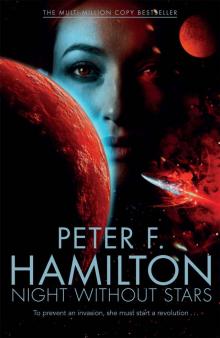 A Night Without Stars
A Night Without Stars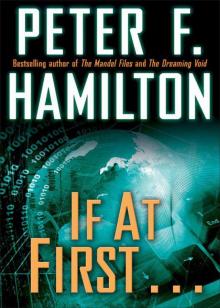 If at First . . .
If at First . . .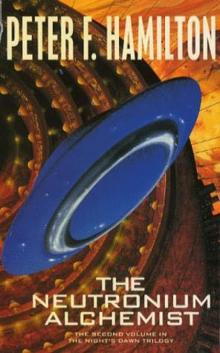 The Neutronium Alchemist
The Neutronium Alchemist Great North Road
Great North Road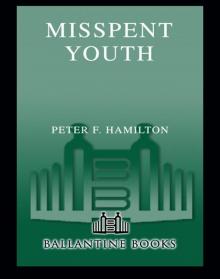 Misspent Youth
Misspent Youth Pandora's Star
Pandora's Star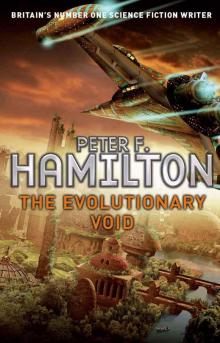 The Evolutionary Void
The Evolutionary Void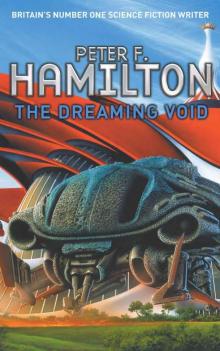 The Dreaming Void
The Dreaming Void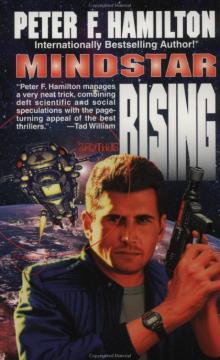 Mindstar Rising
Mindstar Rising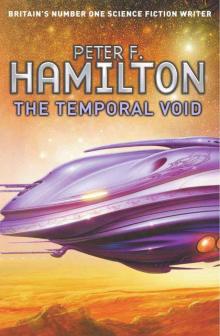 The Temporal Void
The Temporal Void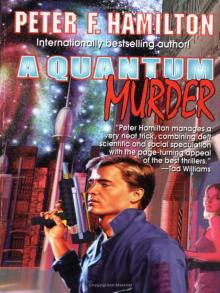 A Quantum Murder
A Quantum Murder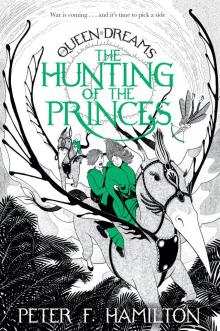 The Hunting of the Princes
The Hunting of the Princes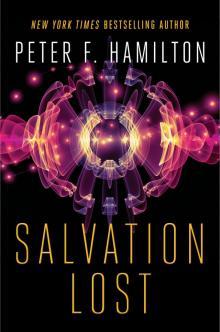 Salvation Lost
Salvation Lost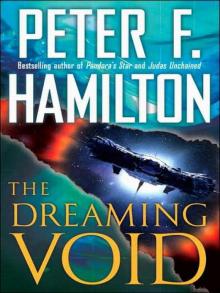 The Dreaming
The Dreaming Salvation
Salvation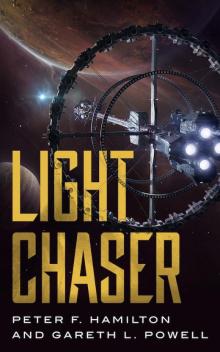 Light Chaser
Light Chaser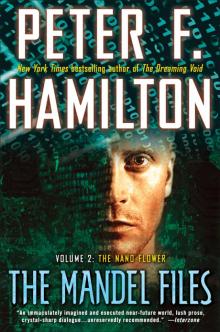 The Mandel Files, Volume 2: The Nano Flower
The Mandel Files, Volume 2: The Nano Flower![The Saints of Salvation [British Ed.] Read online](http://i1.bookreadfree.com/22/the_saints_of_salvation_british_ed__preview.jpg) The Saints of Salvation [British Ed.]
The Saints of Salvation [British Ed.]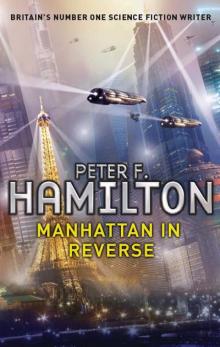 Manhattan in Reverse
Manhattan in Reverse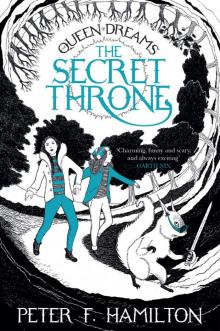 The Secret Throne
The Secret Throne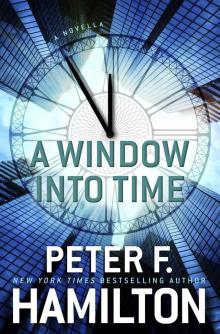 A Window Into Time
A Window Into Time A Second Chance at Eden
A Second Chance at Eden The Nano Flower
The Nano Flower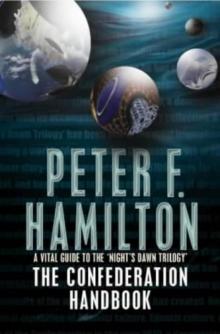 The Confederation Handbook
The Confederation Handbook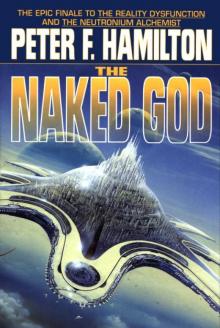 The Naked God
The Naked God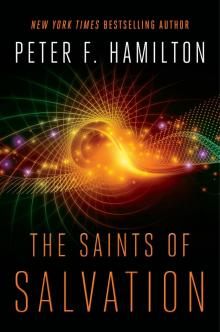 The Saints of Salvation
The Saints of Salvation The Void Trilogy 3-Book Bundle
The Void Trilogy 3-Book Bundle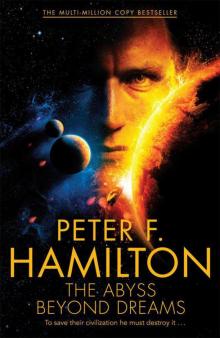 The Abyss Beyond Dreams
The Abyss Beyond Dreams A Voyage Through Air
A Voyage Through Air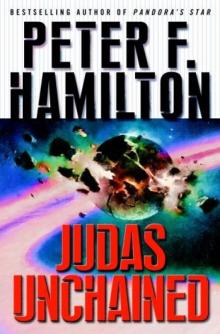 Judas Unchained
Judas Unchained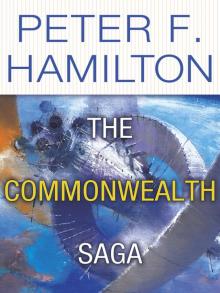 The Commonwealth Saga 2-Book Bundle
The Commonwealth Saga 2-Book Bundle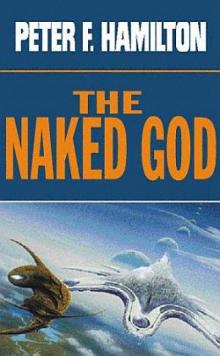 The Naked God - Flight nd-5
The Naked God - Flight nd-5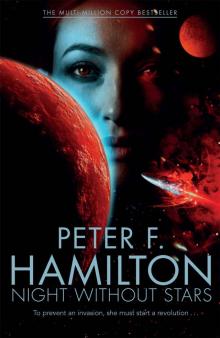 Night Without Stars (Chronicle of the Fallers Book 2)
Night Without Stars (Chronicle of the Fallers Book 2)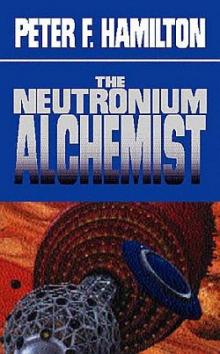 Neutronium Alchemist - Conflict nd-4
Neutronium Alchemist - Conflict nd-4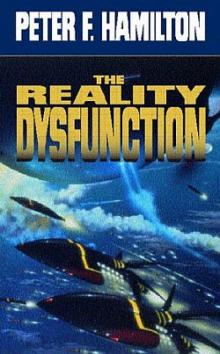 Reality Dysfunction - Expansion nd-2
Reality Dysfunction - Expansion nd-2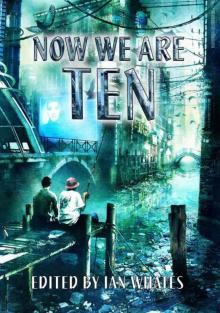 Now We Are Ten: Celebrating the First Ten Years of NewCon Press
Now We Are Ten: Celebrating the First Ten Years of NewCon Press Neutronium Alchemist - Consolidation nd-3
Neutronium Alchemist - Consolidation nd-3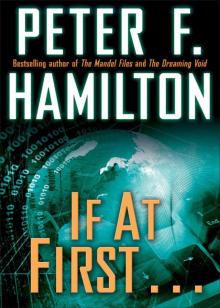 If at First . . . (Short Story)
If at First . . . (Short Story)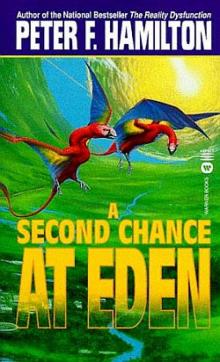 A Second Chance at Eden nd-7
A Second Chance at Eden nd-7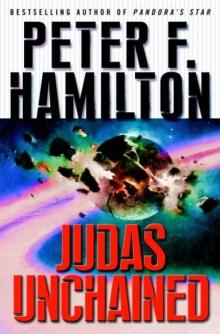 Judas Unchained cs-2
Judas Unchained cs-2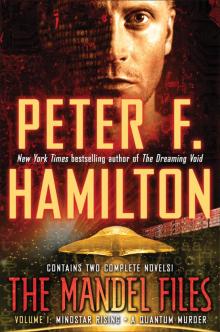 The Mandel Files, Volume 1
The Mandel Files, Volume 1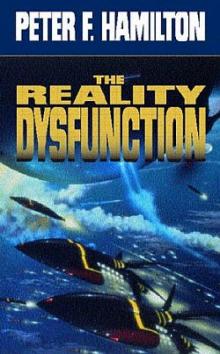 Reality Dysfunction — Emergence nd-1
Reality Dysfunction — Emergence nd-1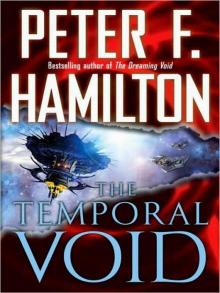 The Temporal Void (ARC)
The Temporal Void (ARC)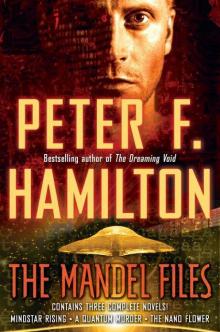 The Mandel Files
The Mandel Files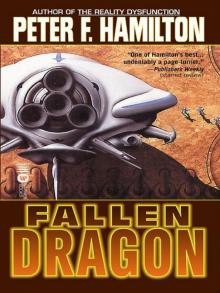 Fallen Fragon
Fallen Fragon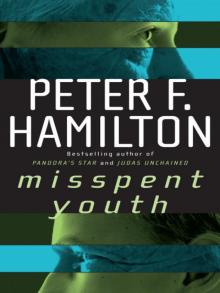 Misspent Youth (commonwealth saga)
Misspent Youth (commonwealth saga)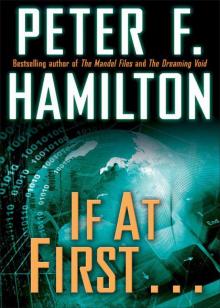 If at First...
If at First... Best of British Science Fiction 2016
Best of British Science Fiction 2016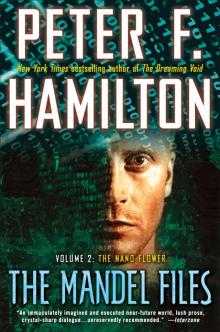 The Mandel Files, Volume 2
The Mandel Files, Volume 2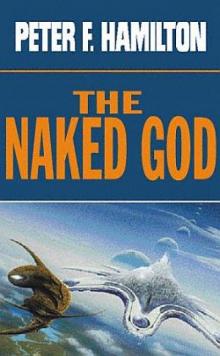 The Naked God - Faith nd-6
The Naked God - Faith nd-6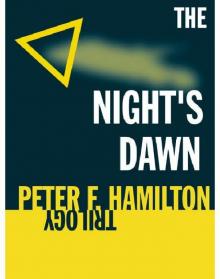 The Night's Dawn Trilogy
The Night's Dawn Trilogy Pandora's Star cs-2
Pandora's Star cs-2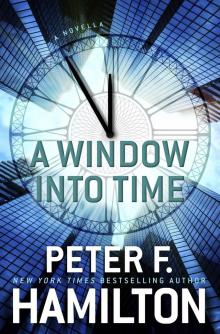 A Window into Time (Novella)
A Window into Time (Novella)